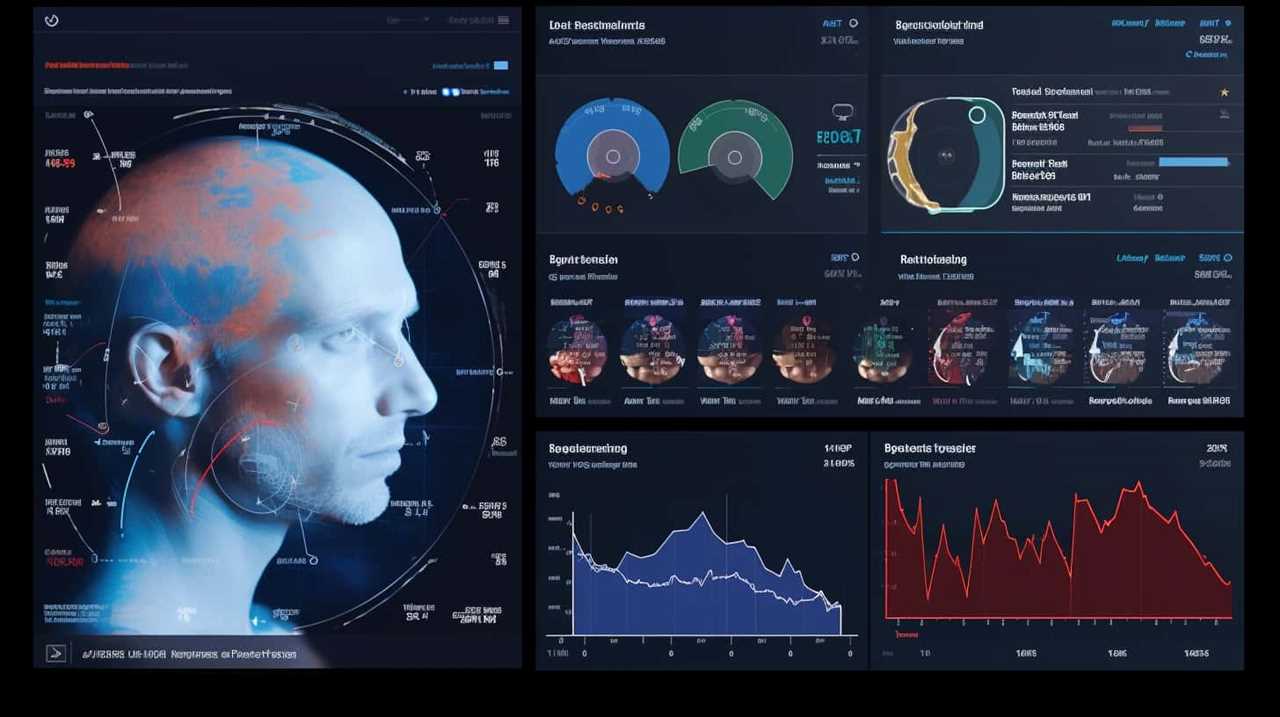We are all observing the rapid expansion of AI and its significant influence on our daily lives. It is projected that by 2025, the global AI market will reach a value of $190 billion.
With this rapid advancement comes the need to navigate the complex landscape of privacy and regulation. In this article, we will explore the potential risks, legal challenges, and ethical considerations surrounding AI’s impact on privacy.
We will also discuss current regulations and offer strategies to help us navigate this ever-evolving technological frontier.
Get ready for an innovative journey ahead.
Key Takeaways
- Increased vulnerability to data breaches and unauthorized access
- Difficulty in defining and regulating AI-generated personal information
- Potential threats to individual privacy from collection and analysis of personal data
- Need for effective global regulations and ethical frameworks to balance innovation and protect individuals’ privacy

Potential Risks to Privacy and Regulation
In this article, we’ll explore the potential risks to privacy and regulation posed by AI. As AI technology continues to advance at an astonishing pace, it brings with it both benefits and concerns.
One of the major risks we face is the increased vulnerability to data breaches. With AI’s ability to process and store vast amounts of data, there’s a heightened risk of unauthorized access and misuse.
Furthermore, the rapid development of surveillance technology powered by AI raises concerns about privacy invasion. As AI systems become more sophisticated, they’re capable of collecting and analyzing massive amounts of personal data, potentially infringing on our right to privacy.
These risks highlight the need for robust regulations and safeguards to ensure the responsible and ethical use of AI technology.
Transitioning into the next section, let’s now delve into the legal challenges posed by AI technology.

Legal Challenges Posed by AI Technology
We will now explore the legal challenges that arise from AI technology. As AI becomes more prevalent in our everyday lives, it brings with it a host of legal concerns, particularly in the areas of data protection and privacy laws. AI technology relies on vast amounts of data to operate effectively, raising questions about how this data is collected, stored, and used. Privacy laws must be updated to address these new challenges and ensure that individuals’ personal information is adequately protected. Additionally, there is a need to establish clear regulations around the accountability and liability of AI systems, as they can have significant impacts on individuals and society as a whole. To illustrate the legal challenges, let’s consider a table:
| Legal Challenges | Implications | Proposed Solutions |
|---|---|---|
| Data Protection | Risk of unauthorized access or misuse of personal data | Implement strict data protection measures, such as encryption and access controls |
| Privacy Laws | Difficulty in defining and regulating AI-generated personal information | Develop specific regulations for AI-generated data and establish guidelines for its use |
| Accountability | Determining liability when AI systems make mistakes or cause harm | Establish clear legal frameworks to hold both developers and users accountable for AI system actions |
Addressing these legal challenges is crucial to ensure that AI technology can be developed and deployed responsibly, fostering innovation while protecting individuals’ rights and privacy.

Ethical Considerations in Ai’s Impact on Privacy
Considering the ethical implications of AI’s impact on privacy, we must carefully examine the potential consequences and responsibilities associated with the use of this technology.
As AI continues to advance and become more integrated into our daily lives, it raises significant privacy concerns. The collection and analysis of vast amounts of personal data can lead to potential threats to individual privacy, such as unauthorized access, misuse, and discrimination. Additionally, there’s the risk of AI systems perpetuating biases and reinforcing existing inequalities.
It’s crucial for organizations and policymakers to prioritize the development of robust ethical frameworks that address these concerns and ensure transparency, accountability, and consent in AI systems. By doing so, we can strike a balance between innovation and protecting individuals’ privacy.
Transitioning into the subsequent section about ‘current regulations and their limitations’, it’s essential to examine the existing legal landscape and identify its shortcomings in addressing these ethical considerations.

Current Regulations and Their Limitations
To understand the current regulations and their limitations surrounding AI’s impact on privacy, it is important to assess the existing legal framework and its effectiveness in addressing ethical concerns. In today’s digital age, data protection and privacy laws are of paramount importance. However, these regulations often struggle to keep pace with rapid advancements in AI technology. While some countries have implemented comprehensive privacy laws, others are still playing catch-up. Additionally, the global nature of AI poses challenges as regulations may vary across jurisdictions. To illustrate this, consider the following table:
| Jurisdiction | Data Protection Regulation |
|---|---|
| European Union | General Data Protection Regulation (GDPR) |
| United States | California Consumer Privacy Act (CCPA) |
| Canada | Personal Information Protection and Electronic Documents Act (PIPEDA) |
| Australia | Privacy Act 1988 |
As AI becomes more ubiquitous, it is clear that current regulations have limitations in addressing its impact on privacy. In the next section, we will explore strategies for navigating these challenges and ensuring the protection of individuals’ privacy in the AI era.

Strategies for Navigating Ai’s Impact on Privacy and Regulation
One effective approach for addressing the limitations of current regulations surrounding AI’s impact on privacy is to implement proactive measures that prioritize data protection and individual privacy.
In order to navigate AI’s impact on privacy and regulation, organizations should consider the following strategies:
- Enhancing transparency: By providing clear and concise information about how AI systems collect, store, and use personal data, organizations can build trust and alleviate privacy concerns.
- Implementing privacy by design: Embedding privacy considerations into the design and development of AI systems can help ensure that privacy is a core component from the outset.
- Conducting privacy impact assessments: Regularly assessing the potential privacy risks associated with AI systems can help identify and mitigate any privacy concerns before they become problematic.
- Collaborating with regulators: Engaging in open and constructive dialogue with regulatory bodies can help shape a regulatory framework that’s both effective in addressing privacy concerns and supportive of innovation.

Frequently Asked Questions
What Are the Potential Benefits of AI Technology in Terms of Privacy and Regulation?
The potential benefits of AI technology in terms of privacy and regulation include improved efficiency, enhanced security measures, and the ability to identify patterns and trends that can help in better protecting individual rights and freedoms.
How Can AI Technology Contribute to the Improvement of Existing Regulations and Privacy Laws?
Using AI for regulatory compliance and AI’s role in privacy protection are crucial for improving existing regulations and privacy laws. It allows us to leverage technology to ensure compliance and protect privacy in innovative and comprehensive ways.
Are There Any Specific Industries or Sectors That Are More Vulnerable to Privacy Risks Posed by AI Technology?
Some industries, like healthcare and finance, are more vulnerable to privacy risks posed by AI technology. Our data shows that these sectors handle sensitive information, making them prime targets for potential breaches.
What Are the Ethical Implications of Using AI Technology to Protect Privacy and Regulate Data?
Ethical considerations arise when examining AI’s impact on privacy and data regulation. It is crucial to evaluate how the use of AI technology can protect privacy without compromising individual rights or perpetuating biases.
Are There Any International Efforts or Collaborations AImed at Addressing the Impact of AI on Privacy and Regulation?
International efforts and collaborative initiatives are being undertaken to address the impact of AI on privacy and regulation. These endeavors aim to develop frameworks and guidelines that ensure the responsible and ethical use of AI technology in protecting personal data.

Conclusion
Well, congratulations to us all! As AI continues to infiltrate every aspect of our lives, we can rest easy knowing that our privacy and regulation are in the safest of hands.
The potential risks, legal challenges, and ethical considerations are simply trivial matters that can be easily swept under the rug. Current regulations, with their charming limitations, will surely protect us from any harm.
So, let’s sit back, relax, and enjoy the show as AI takes over the world. Who needs privacy anyway?









